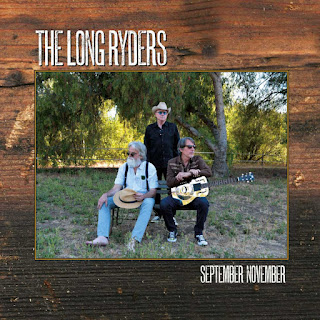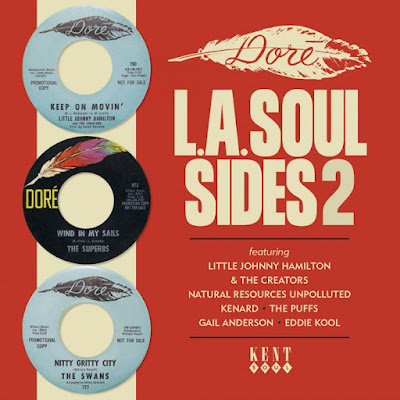Tuesday, December 26, 2023
Sunday, December 17, 2023
Doré L.A. Soul Sides / Doré L.A. Soul Sides 2
The rise of the Doré label coincided with Los Angeles’ ascent as an epicenter in the U.S. recording industry. Along with Era, Del-Fi, GNP Crescendo, Dot, Specialty and Imperial, Doré was part of the scrappy, enterprising and vibrant Los Angeles independent rock ‘n’ roll scene before the major labels (RCA Victor, Columbia, Capitol, Warner Bros.) became truly established and entrenched on the West Coast.
Lewis Bedell’s Doré Records started as a subsidiary of Era Records in 1958. In the shadows of the Capitol Records tower, Doré operated in the heart of Hollywood at Sunset & Vine. In its early stages, the label was known for its numerous pop, doo wop and novelty flops. However, a fortuitous turn of events occurred with the arrival of Phil Spector with his group the Teddy Bears to the label. “To Know Him is to Love Him” was Spector’s breakthrough that went on to become a worldwide hit and an enduring classic. Doré was also the launchpad label for Jan & Dean. In addition, both Lew Adler (Dunhill & Ode Records) and Herb Albert (A&M Records) began their legendary music industry careers at Doré. By the mid-sixties, Lew had the foresight to detect that soul music was the only style that could withstand the onslaught of the British Invasion and the Beatles.
 |
| Lew Bedell-1969 |
The collection opens with the lush and lavish “It Only Hurts for a Little While” by the Whispers, which was recorded at Gold Star Studios with the booming sonics bolstered by such session giants as Hal Blaine, Tommy Tedesco and Jules Wechter. “Baby’s Gone Away” by the Superbs features Eleanor Greene on lead vocals, who would later become known as Eleanor May after her marriage to Los Angeles Angels baseball pitcher Rudy May. Sweet, smooth and spacious vocal harmonies come to the fore on this 1965 single. Eleanor was also involved with the Shade of Jade whose ”Why Does It Feel So Right (Doing Wrong)” sounds like it should have been a 1968 hit as well as almost foreshadowing 1971’s “Mr. Big Stuff” by Jean Knight.
“Family Man” by Slim & the Twilight might be a blatant rip off of “Mother-In-Law” by the Ernie-K-Doe, but it’s also from the pen of Russ Regan who had a legendary career in the music industry starting in promotions with Motown before later presiding over Uni Records. “Family Man” would also have been an apt cover in the age of Peter Zaremba's Love Delegation.
The Superbs appear again with “On a Day When It's Raining.” It’s an easy going atmospheric record that showcases their effervescent vocal group harmony. The Natural Resources were sort of a Doré supergroup and also the label’s entry in the domain of the late ‘60s psychedelic pop-soul to compete with the likes of the 5th Dimension, Friends of Distinction, Rotary Connection. In the early ‘70s, the Natural Resources would record under the name of Natural Resources Unpolluted with a sound that went deeper into the funk a la Sly Stone & the Family Stone.
Pinnacles of Mid-Sixties Soul The liner notes reveal “The Winds Kept Laughing“ by Betty and the Chevelles was augmented by members of the Cascades (of "Rhythm of the Falling Rain” fame). It starts off guitar driven and ramshackle before a surprise turn into sweeping 1964 production pop with a musical bed that evokes “The Lonely Surfer” by Jack Nitzsche from the previous year. The Vel-Vettes’ dramatic 1966 number “You Really Never Know Until It’s Over” follows and is a charming example of the late girl-group sound on the subtle, yet soulful side.
“Gone With the Wind Is My Love” by Rita and the Tiaras contains all the de rigueur elements to make it a classic of the Northern Soul scene. The belting vocals of jazz singer Rita Graham combined with a captivating backing track by the Tiaras lifts this one over the top. Little Johnny Hamilton & the Creators’ “Oh How I Love You” is another stomper blaring with horns and bursting with building energy. In my imagination, I can also hear this covered by the Action and ? and the Mysterians. Further, prepare yourself for an instrumental break on par with Ramsey Lewis.
I was surprised that I hadn't previously heard “We Together Baby” by Smokey & the Bears until this compilation. This thrilling 1967 instrumental is a direct lift of “Louie Louie” blended with “Soul Finger” by the Bar-Kays to whip up an entirely new creation. Hearing the yearning “I Want You” with its spare guitar grandeur by Dee Torres on WFMU’s Cool Blue Flame is what initially drew me to further explore the Doré Records story beyond my Jan & Dean records. The timeless, mysterious and otherworldly song defies categorisation, while also aptly described on YouTube as an “excellent barrio ballad.” The glimmering guitar triplets flicker like candles over swells of organ to cast a sublime atmosphere.
“I Cry Only Once a Day Now” by the Puffs is a 1966 update of a 1962 Lew Bedell composition and is done in classic girl-group fashion. The Superbs continue their role as soft soul serenaders on the second volume with “Goddess of Love.” Bobby Swayne handles the lead vocals on this sunlit soul-pop crossover.
While Doré’s main focus was decidedly on the soul side during the ‘60s, it surprisingly also released some garage & psychedelic records in the mid to late ‘60s. Records from this surprising phase can be heard on the Blow My Mind! The Doré-Era-Mira Punk and Psych Legacy compilation. By the ‘70s, Dore was primarily known as a comedy label and in a way it was a return to form as Lew Bendell started in the entertainment industry as a stand-up comedian. Comedy albums by Hudson & Landy are easy to catch in the used bargain bins here in the West. I bought Hangin’ in There for a buck because it was supposedly recorded at the Pomona National Golf and Country Club. I ended up releasing it back to Goodwill as their '70s humor (which dates quickly) did not do it for me.
Lew Bedell is said to be one of the good guys in the recording industry of the mid-century. He was willing to give musical aspirants a chance to transcend the quotidian and possibly achieve their artistic dreams. Bedell did indeed create a conducive atmosphere for the many who recorded for Doré. These records endure today because they express the wide-open possibilities of Los Angeles. Additionaly, they retain a gritty street level and small label essence now championed by archival labels like Now-Again and Numero Group and embraced by subsequent generations of listeners. These two volumes showcase the remarkable range of the label’s soul releases. Most of all, these records are still breaking through like the sun over the California coast.
 |
| The Creators from Compton who backed Little Johnny Hamilton |













